Research Proposal: High Turnover Rate Impact on Marriott
VerifiedAdded on 2023/03/17
|21
|6478
|71
Report
AI Summary
This research proposal investigates the impact of high employee turnover on organizational productivity within Marriott hotels in Australia. It begins with an introduction outlining the problem, research purpose, objectives, questions, and hypotheses. A comprehensive literature review examines factors affecting employee turnover, including compensation, engagement, job satisfaction, work environment, and employee motivation, highlighting gaps in existing research. The methodology section outlines the research approach, followed by estimated findings, a research plan, and a cost estimate. The proposal emphasizes the importance of organizational culture, particularly in the hospitality industry, and suggests strategies to improve employee retention and productivity. The research aims to provide recommendations to Marriott management, focusing on human resource policies and employee engagement to mitigate the negative effects of high turnover rates. The proposal concludes by emphasizing the significance of understanding and managing employee turnover for the success of the hotel industry and the need for further research to address the challenges of employee retention.
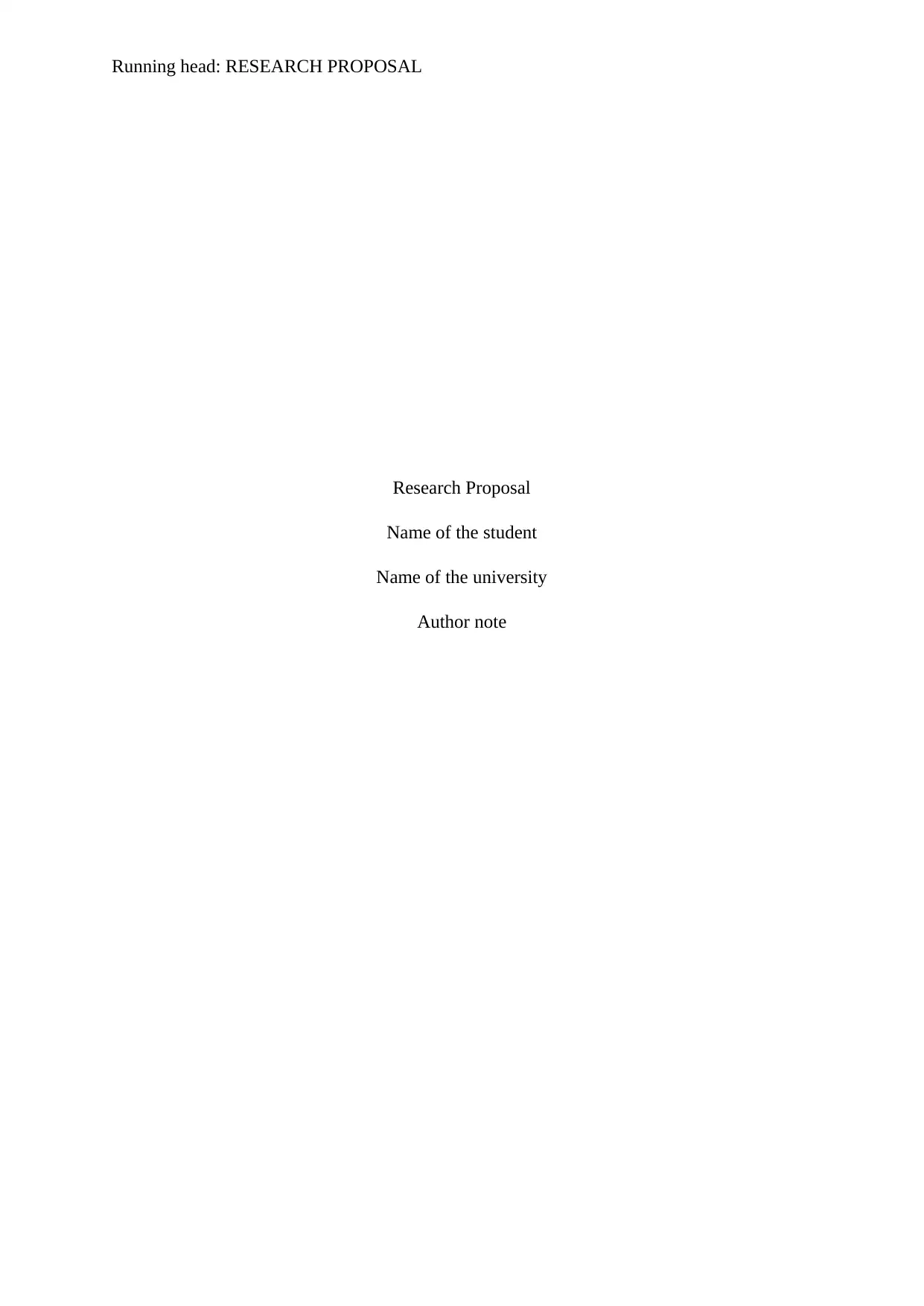
Running head: RESEARCH PROPOSAL
Research Proposal
Name of the student
Name of the university
Author note
Research Proposal
Name of the student
Name of the university
Author note
Paraphrase This Document
Need a fresh take? Get an instant paraphrase of this document with our AI Paraphraser
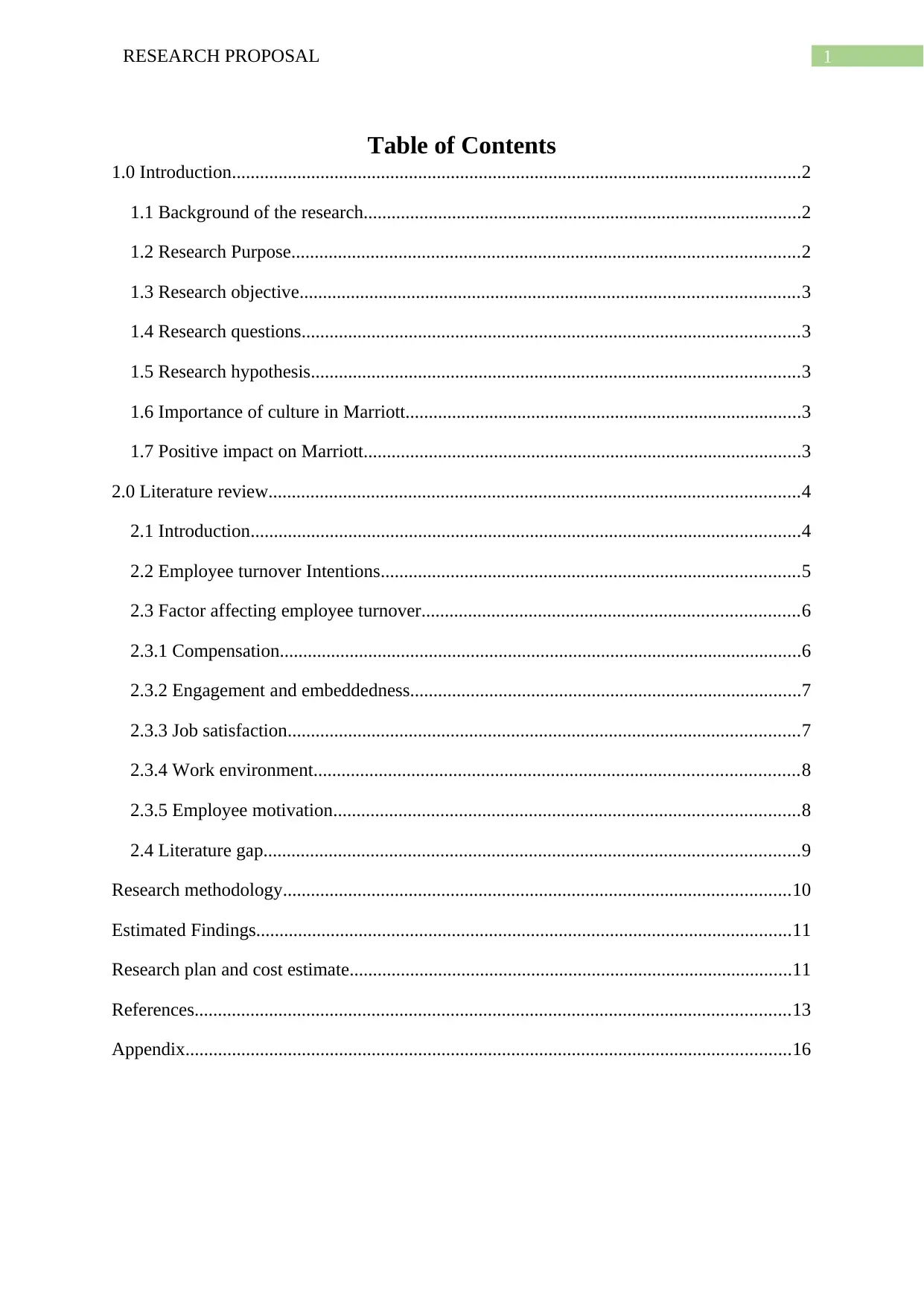
1RESEARCH PROPOSAL
Table of Contents
1.0 Introduction..........................................................................................................................2
1.1 Background of the research..............................................................................................2
1.2 Research Purpose.............................................................................................................2
1.3 Research objective...........................................................................................................3
1.4 Research questions...........................................................................................................3
1.5 Research hypothesis.........................................................................................................3
1.6 Importance of culture in Marriott.....................................................................................3
1.7 Positive impact on Marriott..............................................................................................3
2.0 Literature review..................................................................................................................4
2.1 Introduction......................................................................................................................4
2.2 Employee turnover Intentions..........................................................................................5
2.3 Factor affecting employee turnover.................................................................................6
2.3.1 Compensation................................................................................................................6
2.3.2 Engagement and embeddedness....................................................................................7
2.3.3 Job satisfaction..............................................................................................................7
2.3.4 Work environment........................................................................................................8
2.3.5 Employee motivation....................................................................................................8
2.4 Literature gap...................................................................................................................9
Research methodology.............................................................................................................10
Estimated Findings...................................................................................................................11
Research plan and cost estimate...............................................................................................11
References................................................................................................................................13
Appendix..................................................................................................................................16
Table of Contents
1.0 Introduction..........................................................................................................................2
1.1 Background of the research..............................................................................................2
1.2 Research Purpose.............................................................................................................2
1.3 Research objective...........................................................................................................3
1.4 Research questions...........................................................................................................3
1.5 Research hypothesis.........................................................................................................3
1.6 Importance of culture in Marriott.....................................................................................3
1.7 Positive impact on Marriott..............................................................................................3
2.0 Literature review..................................................................................................................4
2.1 Introduction......................................................................................................................4
2.2 Employee turnover Intentions..........................................................................................5
2.3 Factor affecting employee turnover.................................................................................6
2.3.1 Compensation................................................................................................................6
2.3.2 Engagement and embeddedness....................................................................................7
2.3.3 Job satisfaction..............................................................................................................7
2.3.4 Work environment........................................................................................................8
2.3.5 Employee motivation....................................................................................................8
2.4 Literature gap...................................................................................................................9
Research methodology.............................................................................................................10
Estimated Findings...................................................................................................................11
Research plan and cost estimate...............................................................................................11
References................................................................................................................................13
Appendix..................................................................................................................................16
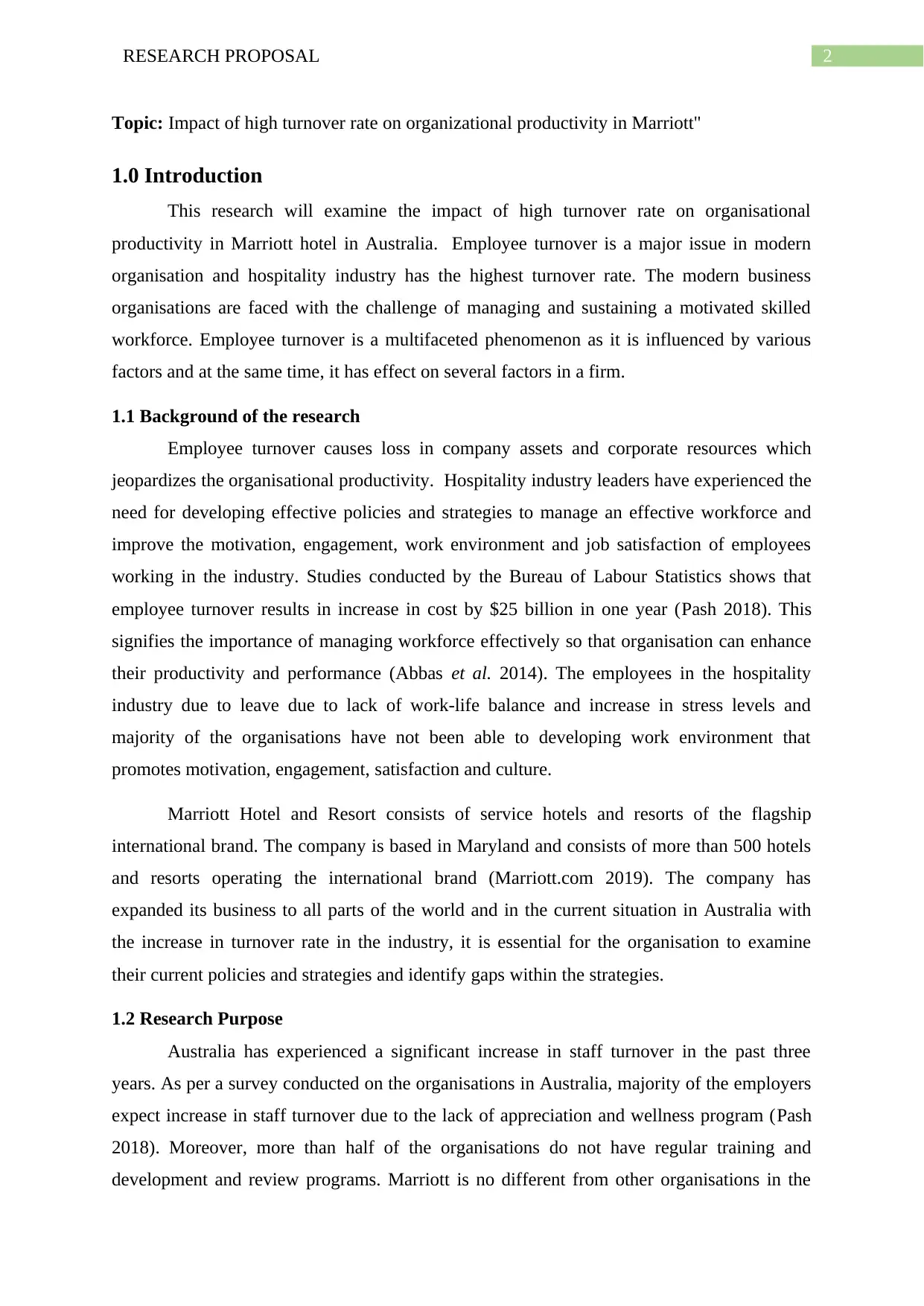
2RESEARCH PROPOSAL
Topic: Impact of high turnover rate on organizational productivity in Marriott"
1.0 Introduction
This research will examine the impact of high turnover rate on organisational
productivity in Marriott hotel in Australia. Employee turnover is a major issue in modern
organisation and hospitality industry has the highest turnover rate. The modern business
organisations are faced with the challenge of managing and sustaining a motivated skilled
workforce. Employee turnover is a multifaceted phenomenon as it is influenced by various
factors and at the same time, it has effect on several factors in a firm.
1.1 Background of the research
Employee turnover causes loss in company assets and corporate resources which
jeopardizes the organisational productivity. Hospitality industry leaders have experienced the
need for developing effective policies and strategies to manage an effective workforce and
improve the motivation, engagement, work environment and job satisfaction of employees
working in the industry. Studies conducted by the Bureau of Labour Statistics shows that
employee turnover results in increase in cost by $25 billion in one year (Pash 2018). This
signifies the importance of managing workforce effectively so that organisation can enhance
their productivity and performance (Abbas et al. 2014). The employees in the hospitality
industry due to leave due to lack of work-life balance and increase in stress levels and
majority of the organisations have not been able to developing work environment that
promotes motivation, engagement, satisfaction and culture.
Marriott Hotel and Resort consists of service hotels and resorts of the flagship
international brand. The company is based in Maryland and consists of more than 500 hotels
and resorts operating the international brand (Marriott.com 2019). The company has
expanded its business to all parts of the world and in the current situation in Australia with
the increase in turnover rate in the industry, it is essential for the organisation to examine
their current policies and strategies and identify gaps within the strategies.
1.2 Research Purpose
Australia has experienced a significant increase in staff turnover in the past three
years. As per a survey conducted on the organisations in Australia, majority of the employers
expect increase in staff turnover due to the lack of appreciation and wellness program (Pash
2018). Moreover, more than half of the organisations do not have regular training and
development and review programs. Marriott is no different from other organisations in the
Topic: Impact of high turnover rate on organizational productivity in Marriott"
1.0 Introduction
This research will examine the impact of high turnover rate on organisational
productivity in Marriott hotel in Australia. Employee turnover is a major issue in modern
organisation and hospitality industry has the highest turnover rate. The modern business
organisations are faced with the challenge of managing and sustaining a motivated skilled
workforce. Employee turnover is a multifaceted phenomenon as it is influenced by various
factors and at the same time, it has effect on several factors in a firm.
1.1 Background of the research
Employee turnover causes loss in company assets and corporate resources which
jeopardizes the organisational productivity. Hospitality industry leaders have experienced the
need for developing effective policies and strategies to manage an effective workforce and
improve the motivation, engagement, work environment and job satisfaction of employees
working in the industry. Studies conducted by the Bureau of Labour Statistics shows that
employee turnover results in increase in cost by $25 billion in one year (Pash 2018). This
signifies the importance of managing workforce effectively so that organisation can enhance
their productivity and performance (Abbas et al. 2014). The employees in the hospitality
industry due to leave due to lack of work-life balance and increase in stress levels and
majority of the organisations have not been able to developing work environment that
promotes motivation, engagement, satisfaction and culture.
Marriott Hotel and Resort consists of service hotels and resorts of the flagship
international brand. The company is based in Maryland and consists of more than 500 hotels
and resorts operating the international brand (Marriott.com 2019). The company has
expanded its business to all parts of the world and in the current situation in Australia with
the increase in turnover rate in the industry, it is essential for the organisation to examine
their current policies and strategies and identify gaps within the strategies.
1.2 Research Purpose
Australia has experienced a significant increase in staff turnover in the past three
years. As per a survey conducted on the organisations in Australia, majority of the employers
expect increase in staff turnover due to the lack of appreciation and wellness program (Pash
2018). Moreover, more than half of the organisations do not have regular training and
development and review programs. Marriott is no different from other organisations in the
⊘ This is a preview!⊘
Do you want full access?
Subscribe today to unlock all pages.

Trusted by 1+ million students worldwide
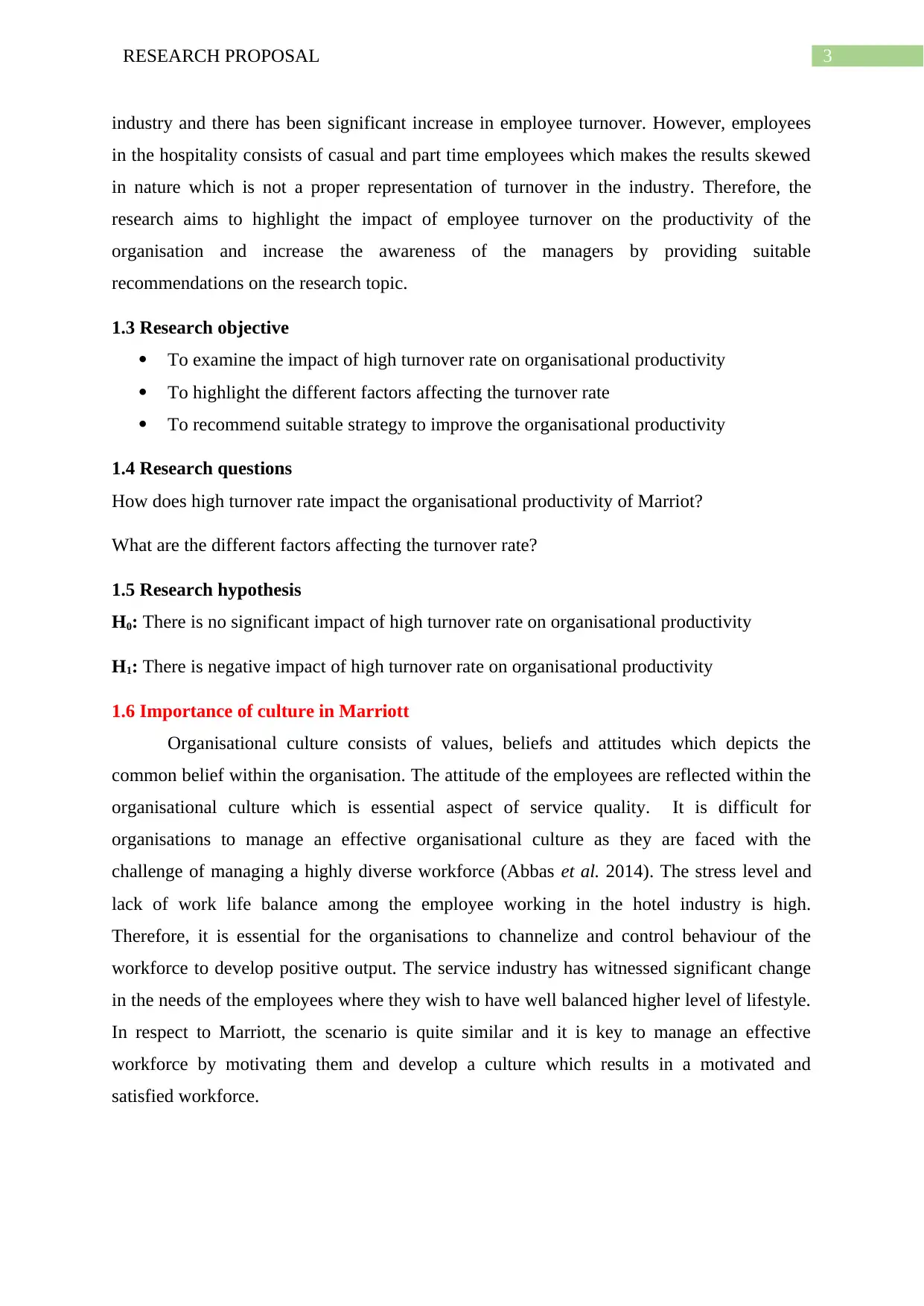
3RESEARCH PROPOSAL
industry and there has been significant increase in employee turnover. However, employees
in the hospitality consists of casual and part time employees which makes the results skewed
in nature which is not a proper representation of turnover in the industry. Therefore, the
research aims to highlight the impact of employee turnover on the productivity of the
organisation and increase the awareness of the managers by providing suitable
recommendations on the research topic.
1.3 Research objective
To examine the impact of high turnover rate on organisational productivity
To highlight the different factors affecting the turnover rate
To recommend suitable strategy to improve the organisational productivity
1.4 Research questions
How does high turnover rate impact the organisational productivity of Marriot?
What are the different factors affecting the turnover rate?
1.5 Research hypothesis
H0: There is no significant impact of high turnover rate on organisational productivity
H1: There is negative impact of high turnover rate on organisational productivity
1.6 Importance of culture in Marriott
Organisational culture consists of values, beliefs and attitudes which depicts the
common belief within the organisation. The attitude of the employees are reflected within the
organisational culture which is essential aspect of service quality. It is difficult for
organisations to manage an effective organisational culture as they are faced with the
challenge of managing a highly diverse workforce (Abbas et al. 2014). The stress level and
lack of work life balance among the employee working in the hotel industry is high.
Therefore, it is essential for the organisations to channelize and control behaviour of the
workforce to develop positive output. The service industry has witnessed significant change
in the needs of the employees where they wish to have well balanced higher level of lifestyle.
In respect to Marriott, the scenario is quite similar and it is key to manage an effective
workforce by motivating them and develop a culture which results in a motivated and
satisfied workforce.
industry and there has been significant increase in employee turnover. However, employees
in the hospitality consists of casual and part time employees which makes the results skewed
in nature which is not a proper representation of turnover in the industry. Therefore, the
research aims to highlight the impact of employee turnover on the productivity of the
organisation and increase the awareness of the managers by providing suitable
recommendations on the research topic.
1.3 Research objective
To examine the impact of high turnover rate on organisational productivity
To highlight the different factors affecting the turnover rate
To recommend suitable strategy to improve the organisational productivity
1.4 Research questions
How does high turnover rate impact the organisational productivity of Marriot?
What are the different factors affecting the turnover rate?
1.5 Research hypothesis
H0: There is no significant impact of high turnover rate on organisational productivity
H1: There is negative impact of high turnover rate on organisational productivity
1.6 Importance of culture in Marriott
Organisational culture consists of values, beliefs and attitudes which depicts the
common belief within the organisation. The attitude of the employees are reflected within the
organisational culture which is essential aspect of service quality. It is difficult for
organisations to manage an effective organisational culture as they are faced with the
challenge of managing a highly diverse workforce (Abbas et al. 2014). The stress level and
lack of work life balance among the employee working in the hotel industry is high.
Therefore, it is essential for the organisations to channelize and control behaviour of the
workforce to develop positive output. The service industry has witnessed significant change
in the needs of the employees where they wish to have well balanced higher level of lifestyle.
In respect to Marriott, the scenario is quite similar and it is key to manage an effective
workforce by motivating them and develop a culture which results in a motivated and
satisfied workforce.
Paraphrase This Document
Need a fresh take? Get an instant paraphrase of this document with our AI Paraphraser
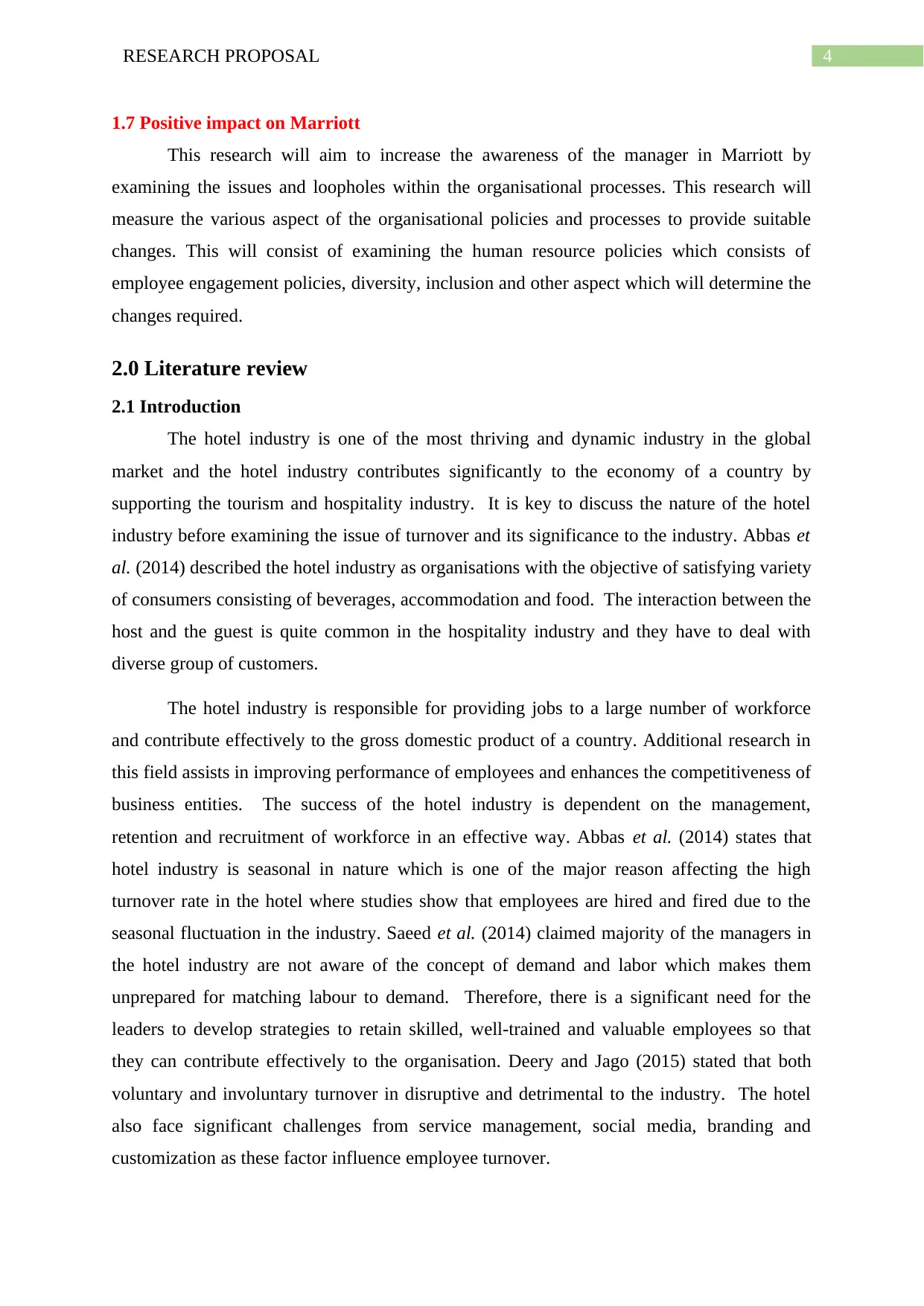
4RESEARCH PROPOSAL
1.7 Positive impact on Marriott
This research will aim to increase the awareness of the manager in Marriott by
examining the issues and loopholes within the organisational processes. This research will
measure the various aspect of the organisational policies and processes to provide suitable
changes. This will consist of examining the human resource policies which consists of
employee engagement policies, diversity, inclusion and other aspect which will determine the
changes required.
2.0 Literature review
2.1 Introduction
The hotel industry is one of the most thriving and dynamic industry in the global
market and the hotel industry contributes significantly to the economy of a country by
supporting the tourism and hospitality industry. It is key to discuss the nature of the hotel
industry before examining the issue of turnover and its significance to the industry. Abbas et
al. (2014) described the hotel industry as organisations with the objective of satisfying variety
of consumers consisting of beverages, accommodation and food. The interaction between the
host and the guest is quite common in the hospitality industry and they have to deal with
diverse group of customers.
The hotel industry is responsible for providing jobs to a large number of workforce
and contribute effectively to the gross domestic product of a country. Additional research in
this field assists in improving performance of employees and enhances the competitiveness of
business entities. The success of the hotel industry is dependent on the management,
retention and recruitment of workforce in an effective way. Abbas et al. (2014) states that
hotel industry is seasonal in nature which is one of the major reason affecting the high
turnover rate in the hotel where studies show that employees are hired and fired due to the
seasonal fluctuation in the industry. Saeed et al. (2014) claimed majority of the managers in
the hotel industry are not aware of the concept of demand and labor which makes them
unprepared for matching labour to demand. Therefore, there is a significant need for the
leaders to develop strategies to retain skilled, well-trained and valuable employees so that
they can contribute effectively to the organisation. Deery and Jago (2015) stated that both
voluntary and involuntary turnover in disruptive and detrimental to the industry. The hotel
also face significant challenges from service management, social media, branding and
customization as these factor influence employee turnover.
1.7 Positive impact on Marriott
This research will aim to increase the awareness of the manager in Marriott by
examining the issues and loopholes within the organisational processes. This research will
measure the various aspect of the organisational policies and processes to provide suitable
changes. This will consist of examining the human resource policies which consists of
employee engagement policies, diversity, inclusion and other aspect which will determine the
changes required.
2.0 Literature review
2.1 Introduction
The hotel industry is one of the most thriving and dynamic industry in the global
market and the hotel industry contributes significantly to the economy of a country by
supporting the tourism and hospitality industry. It is key to discuss the nature of the hotel
industry before examining the issue of turnover and its significance to the industry. Abbas et
al. (2014) described the hotel industry as organisations with the objective of satisfying variety
of consumers consisting of beverages, accommodation and food. The interaction between the
host and the guest is quite common in the hospitality industry and they have to deal with
diverse group of customers.
The hotel industry is responsible for providing jobs to a large number of workforce
and contribute effectively to the gross domestic product of a country. Additional research in
this field assists in improving performance of employees and enhances the competitiveness of
business entities. The success of the hotel industry is dependent on the management,
retention and recruitment of workforce in an effective way. Abbas et al. (2014) states that
hotel industry is seasonal in nature which is one of the major reason affecting the high
turnover rate in the hotel where studies show that employees are hired and fired due to the
seasonal fluctuation in the industry. Saeed et al. (2014) claimed majority of the managers in
the hotel industry are not aware of the concept of demand and labor which makes them
unprepared for matching labour to demand. Therefore, there is a significant need for the
leaders to develop strategies to retain skilled, well-trained and valuable employees so that
they can contribute effectively to the organisation. Deery and Jago (2015) stated that both
voluntary and involuntary turnover in disruptive and detrimental to the industry. The hotel
also face significant challenges from service management, social media, branding and
customization as these factor influence employee turnover.
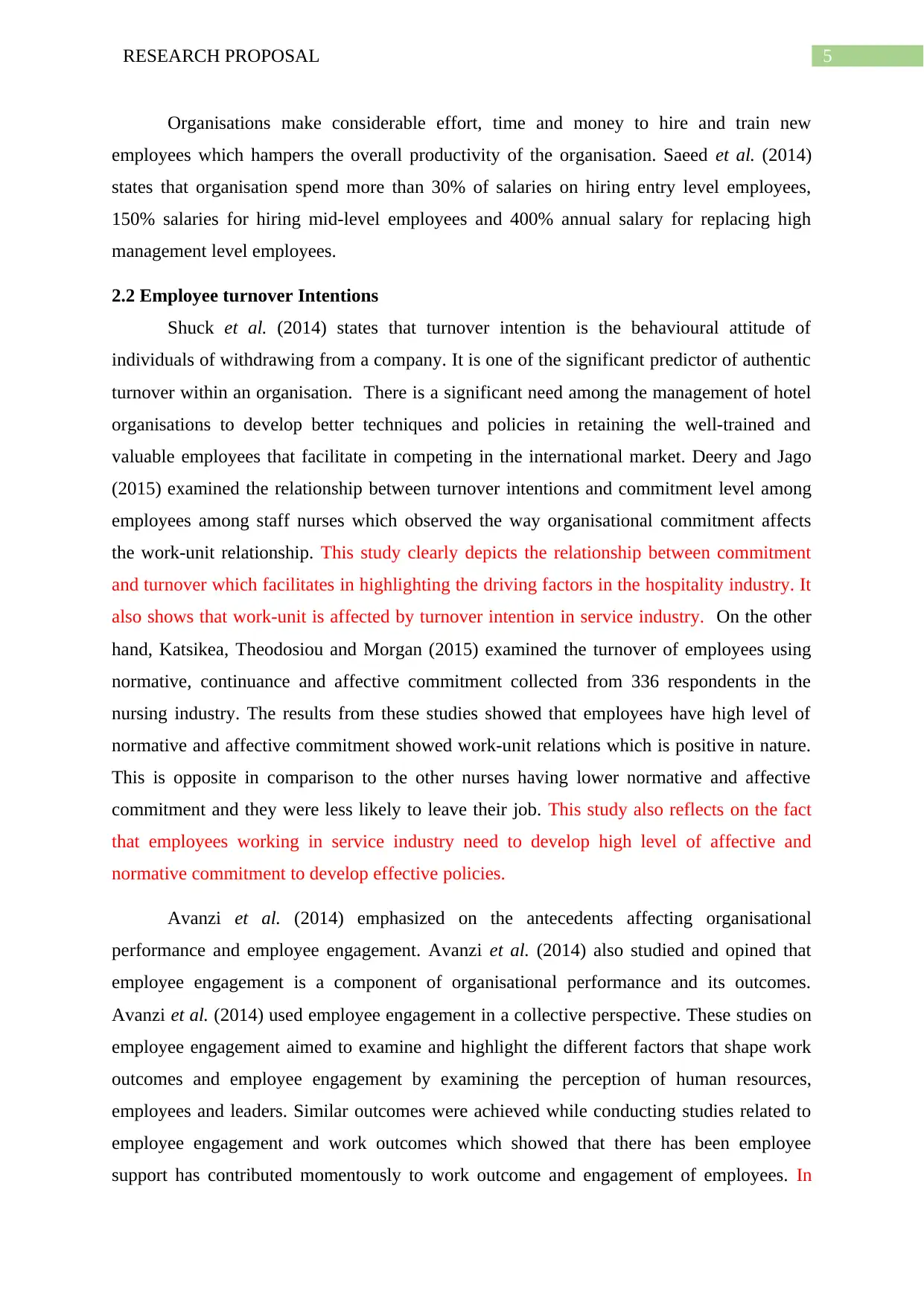
5RESEARCH PROPOSAL
Organisations make considerable effort, time and money to hire and train new
employees which hampers the overall productivity of the organisation. Saeed et al. (2014)
states that organisation spend more than 30% of salaries on hiring entry level employees,
150% salaries for hiring mid-level employees and 400% annual salary for replacing high
management level employees.
2.2 Employee turnover Intentions
Shuck et al. (2014) states that turnover intention is the behavioural attitude of
individuals of withdrawing from a company. It is one of the significant predictor of authentic
turnover within an organisation. There is a significant need among the management of hotel
organisations to develop better techniques and policies in retaining the well-trained and
valuable employees that facilitate in competing in the international market. Deery and Jago
(2015) examined the relationship between turnover intentions and commitment level among
employees among staff nurses which observed the way organisational commitment affects
the work-unit relationship. This study clearly depicts the relationship between commitment
and turnover which facilitates in highlighting the driving factors in the hospitality industry. It
also shows that work-unit is affected by turnover intention in service industry. On the other
hand, Katsikea, Theodosiou and Morgan (2015) examined the turnover of employees using
normative, continuance and affective commitment collected from 336 respondents in the
nursing industry. The results from these studies showed that employees have high level of
normative and affective commitment showed work-unit relations which is positive in nature.
This is opposite in comparison to the other nurses having lower normative and affective
commitment and they were less likely to leave their job. This study also reflects on the fact
that employees working in service industry need to develop high level of affective and
normative commitment to develop effective policies.
Avanzi et al. (2014) emphasized on the antecedents affecting organisational
performance and employee engagement. Avanzi et al. (2014) also studied and opined that
employee engagement is a component of organisational performance and its outcomes.
Avanzi et al. (2014) used employee engagement in a collective perspective. These studies on
employee engagement aimed to examine and highlight the different factors that shape work
outcomes and employee engagement by examining the perception of human resources,
employees and leaders. Similar outcomes were achieved while conducting studies related to
employee engagement and work outcomes which showed that there has been employee
support has contributed momentously to work outcome and engagement of employees. In
Organisations make considerable effort, time and money to hire and train new
employees which hampers the overall productivity of the organisation. Saeed et al. (2014)
states that organisation spend more than 30% of salaries on hiring entry level employees,
150% salaries for hiring mid-level employees and 400% annual salary for replacing high
management level employees.
2.2 Employee turnover Intentions
Shuck et al. (2014) states that turnover intention is the behavioural attitude of
individuals of withdrawing from a company. It is one of the significant predictor of authentic
turnover within an organisation. There is a significant need among the management of hotel
organisations to develop better techniques and policies in retaining the well-trained and
valuable employees that facilitate in competing in the international market. Deery and Jago
(2015) examined the relationship between turnover intentions and commitment level among
employees among staff nurses which observed the way organisational commitment affects
the work-unit relationship. This study clearly depicts the relationship between commitment
and turnover which facilitates in highlighting the driving factors in the hospitality industry. It
also shows that work-unit is affected by turnover intention in service industry. On the other
hand, Katsikea, Theodosiou and Morgan (2015) examined the turnover of employees using
normative, continuance and affective commitment collected from 336 respondents in the
nursing industry. The results from these studies showed that employees have high level of
normative and affective commitment showed work-unit relations which is positive in nature.
This is opposite in comparison to the other nurses having lower normative and affective
commitment and they were less likely to leave their job. This study also reflects on the fact
that employees working in service industry need to develop high level of affective and
normative commitment to develop effective policies.
Avanzi et al. (2014) emphasized on the antecedents affecting organisational
performance and employee engagement. Avanzi et al. (2014) also studied and opined that
employee engagement is a component of organisational performance and its outcomes.
Avanzi et al. (2014) used employee engagement in a collective perspective. These studies on
employee engagement aimed to examine and highlight the different factors that shape work
outcomes and employee engagement by examining the perception of human resources,
employees and leaders. Similar outcomes were achieved while conducting studies related to
employee engagement and work outcomes which showed that there has been employee
support has contributed momentously to work outcome and engagement of employees. In
⊘ This is a preview!⊘
Do you want full access?
Subscribe today to unlock all pages.

Trusted by 1+ million students worldwide
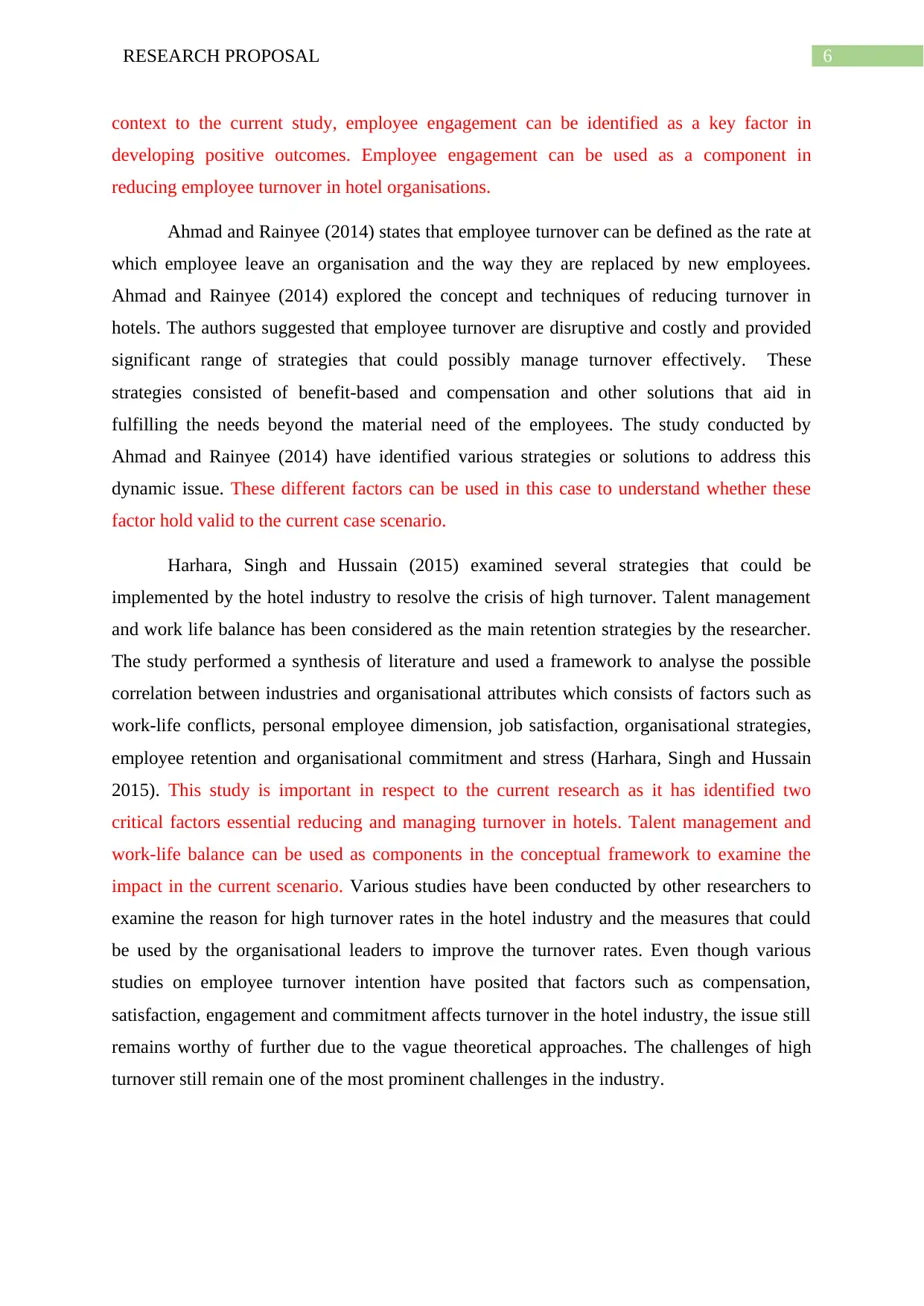
6RESEARCH PROPOSAL
context to the current study, employee engagement can be identified as a key factor in
developing positive outcomes. Employee engagement can be used as a component in
reducing employee turnover in hotel organisations.
Ahmad and Rainyee (2014) states that employee turnover can be defined as the rate at
which employee leave an organisation and the way they are replaced by new employees.
Ahmad and Rainyee (2014) explored the concept and techniques of reducing turnover in
hotels. The authors suggested that employee turnover are disruptive and costly and provided
significant range of strategies that could possibly manage turnover effectively. These
strategies consisted of benefit-based and compensation and other solutions that aid in
fulfilling the needs beyond the material need of the employees. The study conducted by
Ahmad and Rainyee (2014) have identified various strategies or solutions to address this
dynamic issue. These different factors can be used in this case to understand whether these
factor hold valid to the current case scenario.
Harhara, Singh and Hussain (2015) examined several strategies that could be
implemented by the hotel industry to resolve the crisis of high turnover. Talent management
and work life balance has been considered as the main retention strategies by the researcher.
The study performed a synthesis of literature and used a framework to analyse the possible
correlation between industries and organisational attributes which consists of factors such as
work-life conflicts, personal employee dimension, job satisfaction, organisational strategies,
employee retention and organisational commitment and stress (Harhara, Singh and Hussain
2015). This study is important in respect to the current research as it has identified two
critical factors essential reducing and managing turnover in hotels. Talent management and
work-life balance can be used as components in the conceptual framework to examine the
impact in the current scenario. Various studies have been conducted by other researchers to
examine the reason for high turnover rates in the hotel industry and the measures that could
be used by the organisational leaders to improve the turnover rates. Even though various
studies on employee turnover intention have posited that factors such as compensation,
satisfaction, engagement and commitment affects turnover in the hotel industry, the issue still
remains worthy of further due to the vague theoretical approaches. The challenges of high
turnover still remain one of the most prominent challenges in the industry.
context to the current study, employee engagement can be identified as a key factor in
developing positive outcomes. Employee engagement can be used as a component in
reducing employee turnover in hotel organisations.
Ahmad and Rainyee (2014) states that employee turnover can be defined as the rate at
which employee leave an organisation and the way they are replaced by new employees.
Ahmad and Rainyee (2014) explored the concept and techniques of reducing turnover in
hotels. The authors suggested that employee turnover are disruptive and costly and provided
significant range of strategies that could possibly manage turnover effectively. These
strategies consisted of benefit-based and compensation and other solutions that aid in
fulfilling the needs beyond the material need of the employees. The study conducted by
Ahmad and Rainyee (2014) have identified various strategies or solutions to address this
dynamic issue. These different factors can be used in this case to understand whether these
factor hold valid to the current case scenario.
Harhara, Singh and Hussain (2015) examined several strategies that could be
implemented by the hotel industry to resolve the crisis of high turnover. Talent management
and work life balance has been considered as the main retention strategies by the researcher.
The study performed a synthesis of literature and used a framework to analyse the possible
correlation between industries and organisational attributes which consists of factors such as
work-life conflicts, personal employee dimension, job satisfaction, organisational strategies,
employee retention and organisational commitment and stress (Harhara, Singh and Hussain
2015). This study is important in respect to the current research as it has identified two
critical factors essential reducing and managing turnover in hotels. Talent management and
work-life balance can be used as components in the conceptual framework to examine the
impact in the current scenario. Various studies have been conducted by other researchers to
examine the reason for high turnover rates in the hotel industry and the measures that could
be used by the organisational leaders to improve the turnover rates. Even though various
studies on employee turnover intention have posited that factors such as compensation,
satisfaction, engagement and commitment affects turnover in the hotel industry, the issue still
remains worthy of further due to the vague theoretical approaches. The challenges of high
turnover still remain one of the most prominent challenges in the industry.
Paraphrase This Document
Need a fresh take? Get an instant paraphrase of this document with our AI Paraphraser
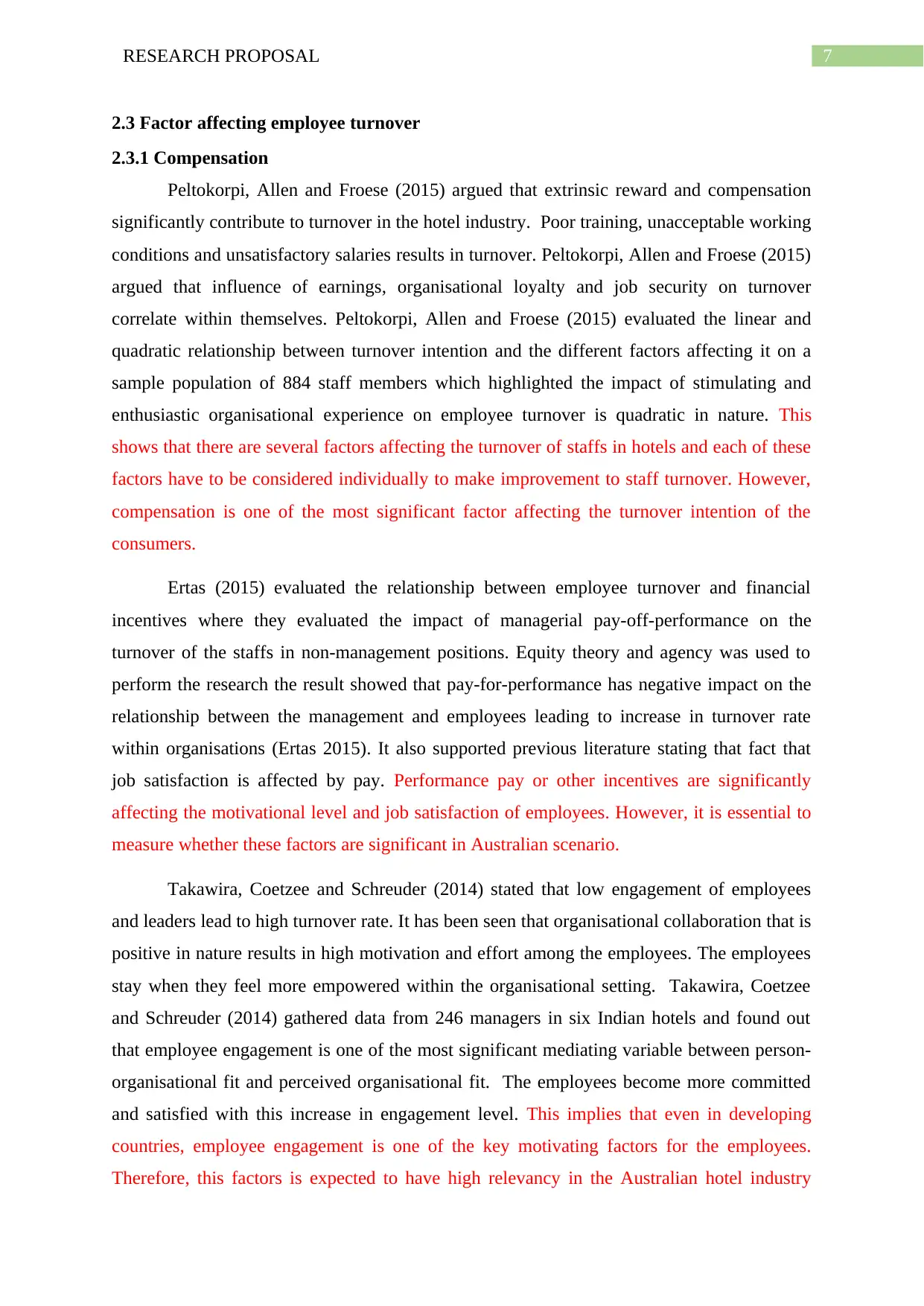
7RESEARCH PROPOSAL
2.3 Factor affecting employee turnover
2.3.1 Compensation
Peltokorpi, Allen and Froese (2015) argued that extrinsic reward and compensation
significantly contribute to turnover in the hotel industry. Poor training, unacceptable working
conditions and unsatisfactory salaries results in turnover. Peltokorpi, Allen and Froese (2015)
argued that influence of earnings, organisational loyalty and job security on turnover
correlate within themselves. Peltokorpi, Allen and Froese (2015) evaluated the linear and
quadratic relationship between turnover intention and the different factors affecting it on a
sample population of 884 staff members which highlighted the impact of stimulating and
enthusiastic organisational experience on employee turnover is quadratic in nature. This
shows that there are several factors affecting the turnover of staffs in hotels and each of these
factors have to be considered individually to make improvement to staff turnover. However,
compensation is one of the most significant factor affecting the turnover intention of the
consumers.
Ertas (2015) evaluated the relationship between employee turnover and financial
incentives where they evaluated the impact of managerial pay-off-performance on the
turnover of the staffs in non-management positions. Equity theory and agency was used to
perform the research the result showed that pay-for-performance has negative impact on the
relationship between the management and employees leading to increase in turnover rate
within organisations (Ertas 2015). It also supported previous literature stating that fact that
job satisfaction is affected by pay. Performance pay or other incentives are significantly
affecting the motivational level and job satisfaction of employees. However, it is essential to
measure whether these factors are significant in Australian scenario.
Takawira, Coetzee and Schreuder (2014) stated that low engagement of employees
and leaders lead to high turnover rate. It has been seen that organisational collaboration that is
positive in nature results in high motivation and effort among the employees. The employees
stay when they feel more empowered within the organisational setting. Takawira, Coetzee
and Schreuder (2014) gathered data from 246 managers in six Indian hotels and found out
that employee engagement is one of the most significant mediating variable between person-
organisational fit and perceived organisational fit. The employees become more committed
and satisfied with this increase in engagement level. This implies that even in developing
countries, employee engagement is one of the key motivating factors for the employees.
Therefore, this factors is expected to have high relevancy in the Australian hotel industry
2.3 Factor affecting employee turnover
2.3.1 Compensation
Peltokorpi, Allen and Froese (2015) argued that extrinsic reward and compensation
significantly contribute to turnover in the hotel industry. Poor training, unacceptable working
conditions and unsatisfactory salaries results in turnover. Peltokorpi, Allen and Froese (2015)
argued that influence of earnings, organisational loyalty and job security on turnover
correlate within themselves. Peltokorpi, Allen and Froese (2015) evaluated the linear and
quadratic relationship between turnover intention and the different factors affecting it on a
sample population of 884 staff members which highlighted the impact of stimulating and
enthusiastic organisational experience on employee turnover is quadratic in nature. This
shows that there are several factors affecting the turnover of staffs in hotels and each of these
factors have to be considered individually to make improvement to staff turnover. However,
compensation is one of the most significant factor affecting the turnover intention of the
consumers.
Ertas (2015) evaluated the relationship between employee turnover and financial
incentives where they evaluated the impact of managerial pay-off-performance on the
turnover of the staffs in non-management positions. Equity theory and agency was used to
perform the research the result showed that pay-for-performance has negative impact on the
relationship between the management and employees leading to increase in turnover rate
within organisations (Ertas 2015). It also supported previous literature stating that fact that
job satisfaction is affected by pay. Performance pay or other incentives are significantly
affecting the motivational level and job satisfaction of employees. However, it is essential to
measure whether these factors are significant in Australian scenario.
Takawira, Coetzee and Schreuder (2014) stated that low engagement of employees
and leaders lead to high turnover rate. It has been seen that organisational collaboration that is
positive in nature results in high motivation and effort among the employees. The employees
stay when they feel more empowered within the organisational setting. Takawira, Coetzee
and Schreuder (2014) gathered data from 246 managers in six Indian hotels and found out
that employee engagement is one of the most significant mediating variable between person-
organisational fit and perceived organisational fit. The employees become more committed
and satisfied with this increase in engagement level. This implies that even in developing
countries, employee engagement is one of the key motivating factors for the employees.
Therefore, this factors is expected to have high relevancy in the Australian hotel industry
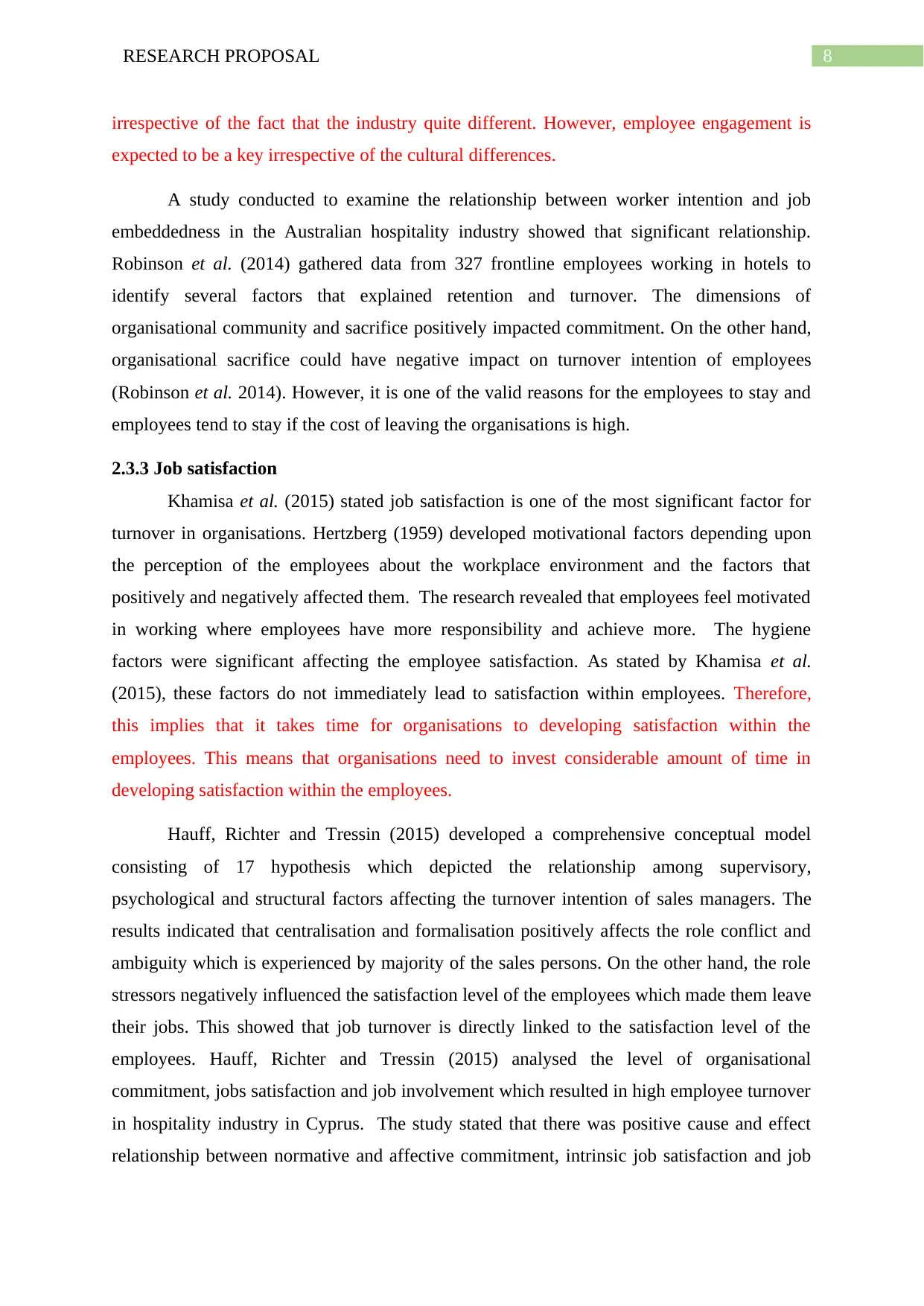
8RESEARCH PROPOSAL
irrespective of the fact that the industry quite different. However, employee engagement is
expected to be a key irrespective of the cultural differences.
A study conducted to examine the relationship between worker intention and job
embeddedness in the Australian hospitality industry showed that significant relationship.
Robinson et al. (2014) gathered data from 327 frontline employees working in hotels to
identify several factors that explained retention and turnover. The dimensions of
organisational community and sacrifice positively impacted commitment. On the other hand,
organisational sacrifice could have negative impact on turnover intention of employees
(Robinson et al. 2014). However, it is one of the valid reasons for the employees to stay and
employees tend to stay if the cost of leaving the organisations is high.
2.3.3 Job satisfaction
Khamisa et al. (2015) stated job satisfaction is one of the most significant factor for
turnover in organisations. Hertzberg (1959) developed motivational factors depending upon
the perception of the employees about the workplace environment and the factors that
positively and negatively affected them. The research revealed that employees feel motivated
in working where employees have more responsibility and achieve more. The hygiene
factors were significant affecting the employee satisfaction. As stated by Khamisa et al.
(2015), these factors do not immediately lead to satisfaction within employees. Therefore,
this implies that it takes time for organisations to developing satisfaction within the
employees. This means that organisations need to invest considerable amount of time in
developing satisfaction within the employees.
Hauff, Richter and Tressin (2015) developed a comprehensive conceptual model
consisting of 17 hypothesis which depicted the relationship among supervisory,
psychological and structural factors affecting the turnover intention of sales managers. The
results indicated that centralisation and formalisation positively affects the role conflict and
ambiguity which is experienced by majority of the sales persons. On the other hand, the role
stressors negatively influenced the satisfaction level of the employees which made them leave
their jobs. This showed that job turnover is directly linked to the satisfaction level of the
employees. Hauff, Richter and Tressin (2015) analysed the level of organisational
commitment, jobs satisfaction and job involvement which resulted in high employee turnover
in hospitality industry in Cyprus. The study stated that there was positive cause and effect
relationship between normative and affective commitment, intrinsic job satisfaction and job
irrespective of the fact that the industry quite different. However, employee engagement is
expected to be a key irrespective of the cultural differences.
A study conducted to examine the relationship between worker intention and job
embeddedness in the Australian hospitality industry showed that significant relationship.
Robinson et al. (2014) gathered data from 327 frontline employees working in hotels to
identify several factors that explained retention and turnover. The dimensions of
organisational community and sacrifice positively impacted commitment. On the other hand,
organisational sacrifice could have negative impact on turnover intention of employees
(Robinson et al. 2014). However, it is one of the valid reasons for the employees to stay and
employees tend to stay if the cost of leaving the organisations is high.
2.3.3 Job satisfaction
Khamisa et al. (2015) stated job satisfaction is one of the most significant factor for
turnover in organisations. Hertzberg (1959) developed motivational factors depending upon
the perception of the employees about the workplace environment and the factors that
positively and negatively affected them. The research revealed that employees feel motivated
in working where employees have more responsibility and achieve more. The hygiene
factors were significant affecting the employee satisfaction. As stated by Khamisa et al.
(2015), these factors do not immediately lead to satisfaction within employees. Therefore,
this implies that it takes time for organisations to developing satisfaction within the
employees. This means that organisations need to invest considerable amount of time in
developing satisfaction within the employees.
Hauff, Richter and Tressin (2015) developed a comprehensive conceptual model
consisting of 17 hypothesis which depicted the relationship among supervisory,
psychological and structural factors affecting the turnover intention of sales managers. The
results indicated that centralisation and formalisation positively affects the role conflict and
ambiguity which is experienced by majority of the sales persons. On the other hand, the role
stressors negatively influenced the satisfaction level of the employees which made them leave
their jobs. This showed that job turnover is directly linked to the satisfaction level of the
employees. Hauff, Richter and Tressin (2015) analysed the level of organisational
commitment, jobs satisfaction and job involvement which resulted in high employee turnover
in hospitality industry in Cyprus. The study stated that there was positive cause and effect
relationship between normative and affective commitment, intrinsic job satisfaction and job
⊘ This is a preview!⊘
Do you want full access?
Subscribe today to unlock all pages.

Trusted by 1+ million students worldwide
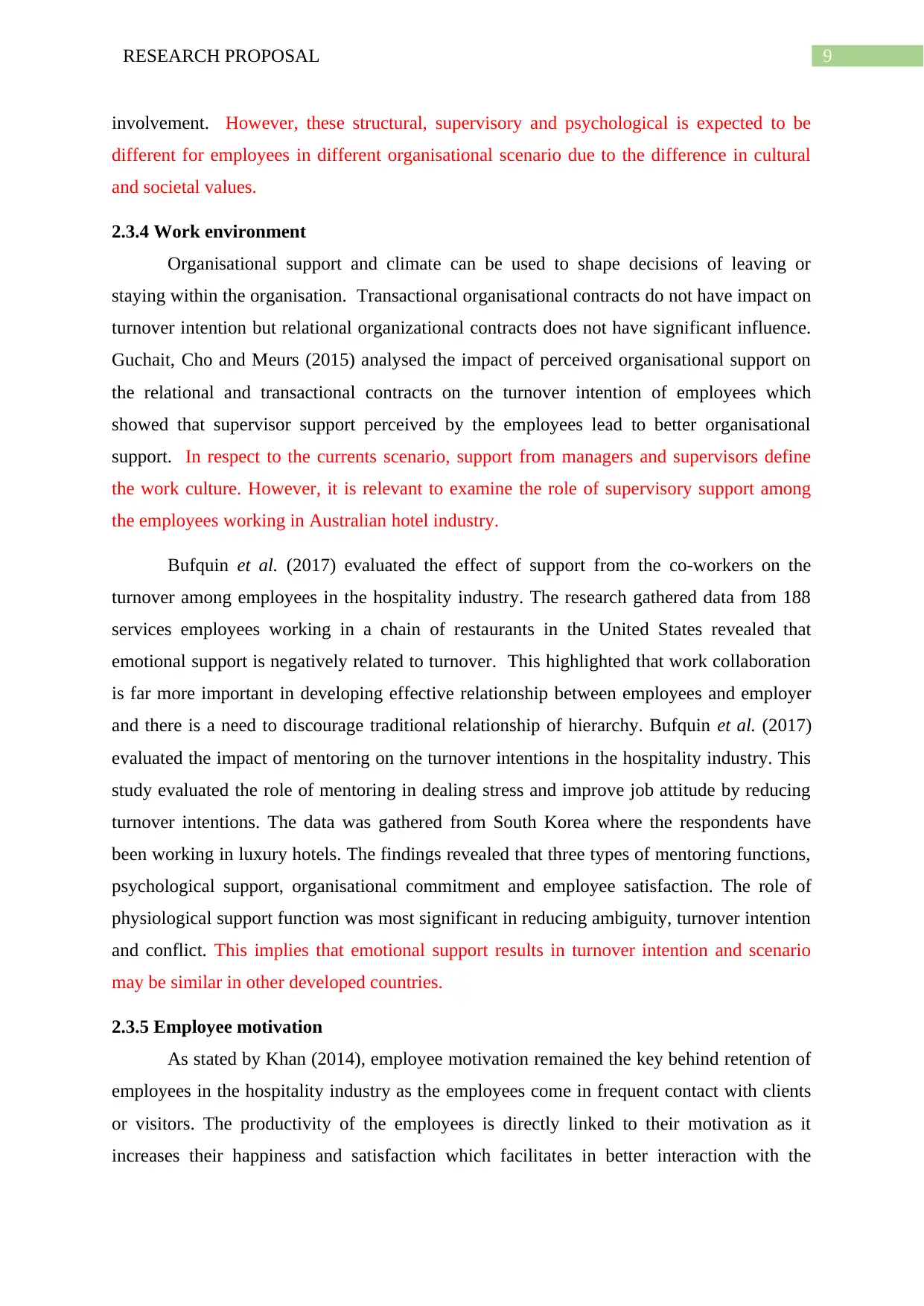
9RESEARCH PROPOSAL
involvement. However, these structural, supervisory and psychological is expected to be
different for employees in different organisational scenario due to the difference in cultural
and societal values.
2.3.4 Work environment
Organisational support and climate can be used to shape decisions of leaving or
staying within the organisation. Transactional organisational contracts do not have impact on
turnover intention but relational organizational contracts does not have significant influence.
Guchait, Cho and Meurs (2015) analysed the impact of perceived organisational support on
the relational and transactional contracts on the turnover intention of employees which
showed that supervisor support perceived by the employees lead to better organisational
support. In respect to the currents scenario, support from managers and supervisors define
the work culture. However, it is relevant to examine the role of supervisory support among
the employees working in Australian hotel industry.
Bufquin et al. (2017) evaluated the effect of support from the co-workers on the
turnover among employees in the hospitality industry. The research gathered data from 188
services employees working in a chain of restaurants in the United States revealed that
emotional support is negatively related to turnover. This highlighted that work collaboration
is far more important in developing effective relationship between employees and employer
and there is a need to discourage traditional relationship of hierarchy. Bufquin et al. (2017)
evaluated the impact of mentoring on the turnover intentions in the hospitality industry. This
study evaluated the role of mentoring in dealing stress and improve job attitude by reducing
turnover intentions. The data was gathered from South Korea where the respondents have
been working in luxury hotels. The findings revealed that three types of mentoring functions,
psychological support, organisational commitment and employee satisfaction. The role of
physiological support function was most significant in reducing ambiguity, turnover intention
and conflict. This implies that emotional support results in turnover intention and scenario
may be similar in other developed countries.
2.3.5 Employee motivation
As stated by Khan (2014), employee motivation remained the key behind retention of
employees in the hospitality industry as the employees come in frequent contact with clients
or visitors. The productivity of the employees is directly linked to their motivation as it
increases their happiness and satisfaction which facilitates in better interaction with the
involvement. However, these structural, supervisory and psychological is expected to be
different for employees in different organisational scenario due to the difference in cultural
and societal values.
2.3.4 Work environment
Organisational support and climate can be used to shape decisions of leaving or
staying within the organisation. Transactional organisational contracts do not have impact on
turnover intention but relational organizational contracts does not have significant influence.
Guchait, Cho and Meurs (2015) analysed the impact of perceived organisational support on
the relational and transactional contracts on the turnover intention of employees which
showed that supervisor support perceived by the employees lead to better organisational
support. In respect to the currents scenario, support from managers and supervisors define
the work culture. However, it is relevant to examine the role of supervisory support among
the employees working in Australian hotel industry.
Bufquin et al. (2017) evaluated the effect of support from the co-workers on the
turnover among employees in the hospitality industry. The research gathered data from 188
services employees working in a chain of restaurants in the United States revealed that
emotional support is negatively related to turnover. This highlighted that work collaboration
is far more important in developing effective relationship between employees and employer
and there is a need to discourage traditional relationship of hierarchy. Bufquin et al. (2017)
evaluated the impact of mentoring on the turnover intentions in the hospitality industry. This
study evaluated the role of mentoring in dealing stress and improve job attitude by reducing
turnover intentions. The data was gathered from South Korea where the respondents have
been working in luxury hotels. The findings revealed that three types of mentoring functions,
psychological support, organisational commitment and employee satisfaction. The role of
physiological support function was most significant in reducing ambiguity, turnover intention
and conflict. This implies that emotional support results in turnover intention and scenario
may be similar in other developed countries.
2.3.5 Employee motivation
As stated by Khan (2014), employee motivation remained the key behind retention of
employees in the hospitality industry as the employees come in frequent contact with clients
or visitors. The productivity of the employees is directly linked to their motivation as it
increases their happiness and satisfaction which facilitates in better interaction with the
Paraphrase This Document
Need a fresh take? Get an instant paraphrase of this document with our AI Paraphraser
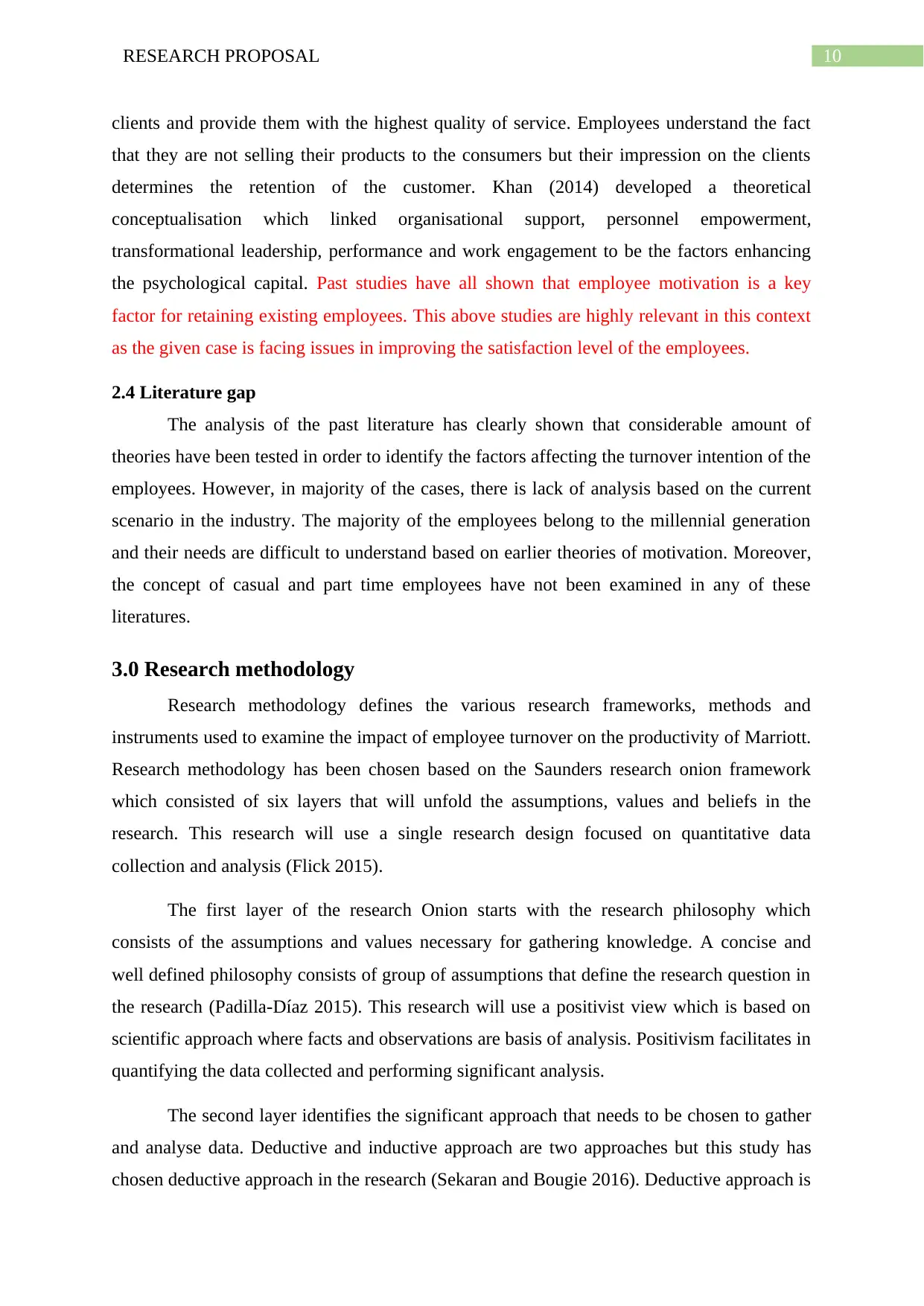
10RESEARCH PROPOSAL
clients and provide them with the highest quality of service. Employees understand the fact
that they are not selling their products to the consumers but their impression on the clients
determines the retention of the customer. Khan (2014) developed a theoretical
conceptualisation which linked organisational support, personnel empowerment,
transformational leadership, performance and work engagement to be the factors enhancing
the psychological capital. Past studies have all shown that employee motivation is a key
factor for retaining existing employees. This above studies are highly relevant in this context
as the given case is facing issues in improving the satisfaction level of the employees.
2.4 Literature gap
The analysis of the past literature has clearly shown that considerable amount of
theories have been tested in order to identify the factors affecting the turnover intention of the
employees. However, in majority of the cases, there is lack of analysis based on the current
scenario in the industry. The majority of the employees belong to the millennial generation
and their needs are difficult to understand based on earlier theories of motivation. Moreover,
the concept of casual and part time employees have not been examined in any of these
literatures.
3.0 Research methodology
Research methodology defines the various research frameworks, methods and
instruments used to examine the impact of employee turnover on the productivity of Marriott.
Research methodology has been chosen based on the Saunders research onion framework
which consisted of six layers that will unfold the assumptions, values and beliefs in the
research. This research will use a single research design focused on quantitative data
collection and analysis (Flick 2015).
The first layer of the research Onion starts with the research philosophy which
consists of the assumptions and values necessary for gathering knowledge. A concise and
well defined philosophy consists of group of assumptions that define the research question in
the research (Padilla-Díaz 2015). This research will use a positivist view which is based on
scientific approach where facts and observations are basis of analysis. Positivism facilitates in
quantifying the data collected and performing significant analysis.
The second layer identifies the significant approach that needs to be chosen to gather
and analyse data. Deductive and inductive approach are two approaches but this study has
chosen deductive approach in the research (Sekaran and Bougie 2016). Deductive approach is
clients and provide them with the highest quality of service. Employees understand the fact
that they are not selling their products to the consumers but their impression on the clients
determines the retention of the customer. Khan (2014) developed a theoretical
conceptualisation which linked organisational support, personnel empowerment,
transformational leadership, performance and work engagement to be the factors enhancing
the psychological capital. Past studies have all shown that employee motivation is a key
factor for retaining existing employees. This above studies are highly relevant in this context
as the given case is facing issues in improving the satisfaction level of the employees.
2.4 Literature gap
The analysis of the past literature has clearly shown that considerable amount of
theories have been tested in order to identify the factors affecting the turnover intention of the
employees. However, in majority of the cases, there is lack of analysis based on the current
scenario in the industry. The majority of the employees belong to the millennial generation
and their needs are difficult to understand based on earlier theories of motivation. Moreover,
the concept of casual and part time employees have not been examined in any of these
literatures.
3.0 Research methodology
Research methodology defines the various research frameworks, methods and
instruments used to examine the impact of employee turnover on the productivity of Marriott.
Research methodology has been chosen based on the Saunders research onion framework
which consisted of six layers that will unfold the assumptions, values and beliefs in the
research. This research will use a single research design focused on quantitative data
collection and analysis (Flick 2015).
The first layer of the research Onion starts with the research philosophy which
consists of the assumptions and values necessary for gathering knowledge. A concise and
well defined philosophy consists of group of assumptions that define the research question in
the research (Padilla-Díaz 2015). This research will use a positivist view which is based on
scientific approach where facts and observations are basis of analysis. Positivism facilitates in
quantifying the data collected and performing significant analysis.
The second layer identifies the significant approach that needs to be chosen to gather
and analyse data. Deductive and inductive approach are two approaches but this study has
chosen deductive approach in the research (Sekaran and Bougie 2016). Deductive approach is
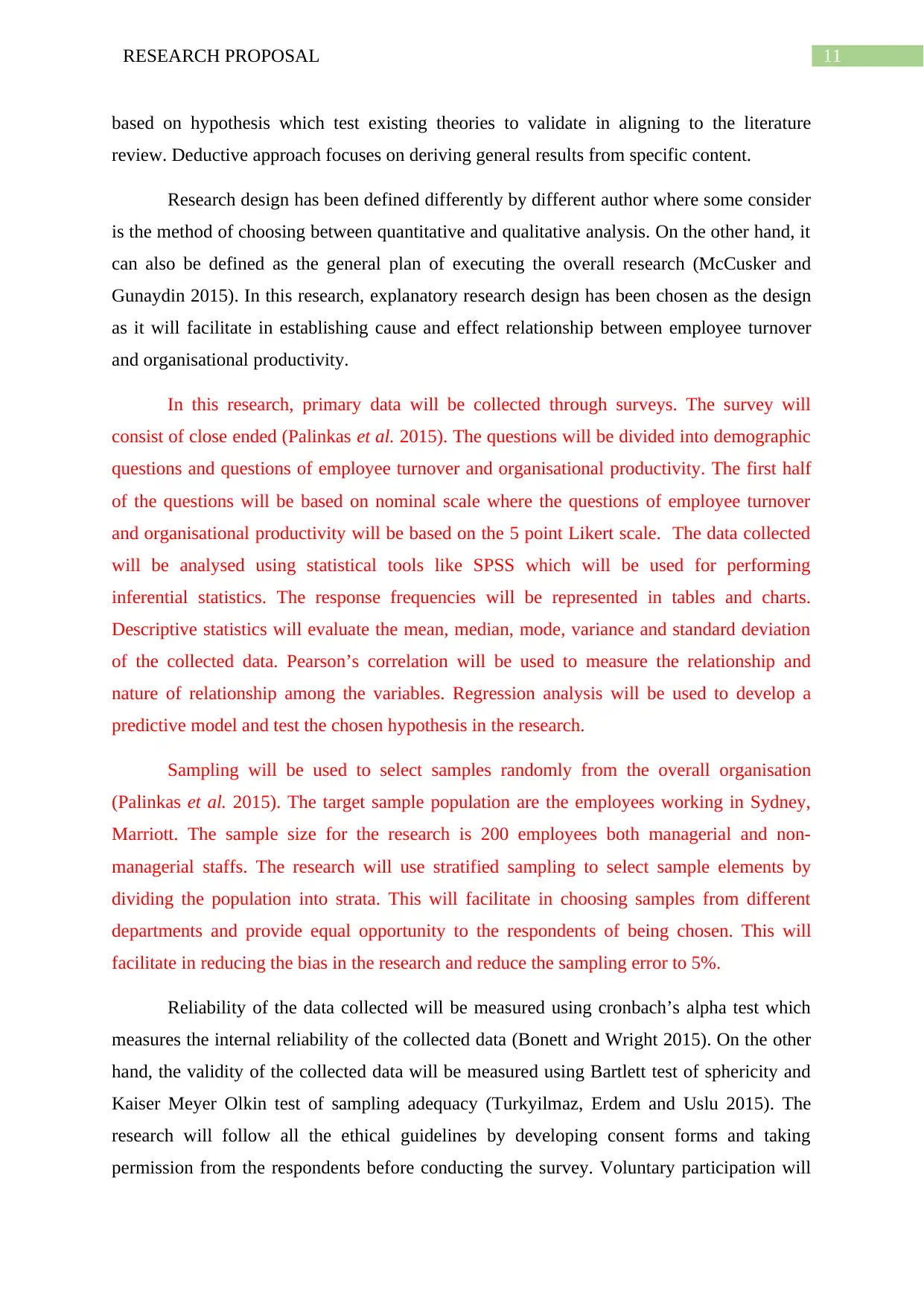
11RESEARCH PROPOSAL
based on hypothesis which test existing theories to validate in aligning to the literature
review. Deductive approach focuses on deriving general results from specific content.
Research design has been defined differently by different author where some consider
is the method of choosing between quantitative and qualitative analysis. On the other hand, it
can also be defined as the general plan of executing the overall research (McCusker and
Gunaydin 2015). In this research, explanatory research design has been chosen as the design
as it will facilitate in establishing cause and effect relationship between employee turnover
and organisational productivity.
In this research, primary data will be collected through surveys. The survey will
consist of close ended (Palinkas et al. 2015). The questions will be divided into demographic
questions and questions of employee turnover and organisational productivity. The first half
of the questions will be based on nominal scale where the questions of employee turnover
and organisational productivity will be based on the 5 point Likert scale. The data collected
will be analysed using statistical tools like SPSS which will be used for performing
inferential statistics. The response frequencies will be represented in tables and charts.
Descriptive statistics will evaluate the mean, median, mode, variance and standard deviation
of the collected data. Pearson’s correlation will be used to measure the relationship and
nature of relationship among the variables. Regression analysis will be used to develop a
predictive model and test the chosen hypothesis in the research.
Sampling will be used to select samples randomly from the overall organisation
(Palinkas et al. 2015). The target sample population are the employees working in Sydney,
Marriott. The sample size for the research is 200 employees both managerial and non-
managerial staffs. The research will use stratified sampling to select sample elements by
dividing the population into strata. This will facilitate in choosing samples from different
departments and provide equal opportunity to the respondents of being chosen. This will
facilitate in reducing the bias in the research and reduce the sampling error to 5%.
Reliability of the data collected will be measured using cronbach’s alpha test which
measures the internal reliability of the collected data (Bonett and Wright 2015). On the other
hand, the validity of the collected data will be measured using Bartlett test of sphericity and
Kaiser Meyer Olkin test of sampling adequacy (Turkyilmaz, Erdem and Uslu 2015). The
research will follow all the ethical guidelines by developing consent forms and taking
permission from the respondents before conducting the survey. Voluntary participation will
based on hypothesis which test existing theories to validate in aligning to the literature
review. Deductive approach focuses on deriving general results from specific content.
Research design has been defined differently by different author where some consider
is the method of choosing between quantitative and qualitative analysis. On the other hand, it
can also be defined as the general plan of executing the overall research (McCusker and
Gunaydin 2015). In this research, explanatory research design has been chosen as the design
as it will facilitate in establishing cause and effect relationship between employee turnover
and organisational productivity.
In this research, primary data will be collected through surveys. The survey will
consist of close ended (Palinkas et al. 2015). The questions will be divided into demographic
questions and questions of employee turnover and organisational productivity. The first half
of the questions will be based on nominal scale where the questions of employee turnover
and organisational productivity will be based on the 5 point Likert scale. The data collected
will be analysed using statistical tools like SPSS which will be used for performing
inferential statistics. The response frequencies will be represented in tables and charts.
Descriptive statistics will evaluate the mean, median, mode, variance and standard deviation
of the collected data. Pearson’s correlation will be used to measure the relationship and
nature of relationship among the variables. Regression analysis will be used to develop a
predictive model and test the chosen hypothesis in the research.
Sampling will be used to select samples randomly from the overall organisation
(Palinkas et al. 2015). The target sample population are the employees working in Sydney,
Marriott. The sample size for the research is 200 employees both managerial and non-
managerial staffs. The research will use stratified sampling to select sample elements by
dividing the population into strata. This will facilitate in choosing samples from different
departments and provide equal opportunity to the respondents of being chosen. This will
facilitate in reducing the bias in the research and reduce the sampling error to 5%.
Reliability of the data collected will be measured using cronbach’s alpha test which
measures the internal reliability of the collected data (Bonett and Wright 2015). On the other
hand, the validity of the collected data will be measured using Bartlett test of sphericity and
Kaiser Meyer Olkin test of sampling adequacy (Turkyilmaz, Erdem and Uslu 2015). The
research will follow all the ethical guidelines by developing consent forms and taking
permission from the respondents before conducting the survey. Voluntary participation will
⊘ This is a preview!⊘
Do you want full access?
Subscribe today to unlock all pages.

Trusted by 1+ million students worldwide
1 out of 21
Related Documents
Your All-in-One AI-Powered Toolkit for Academic Success.
+13062052269
info@desklib.com
Available 24*7 on WhatsApp / Email
![[object Object]](/_next/static/media/star-bottom.7253800d.svg)
Unlock your academic potential
Copyright © 2020–2026 A2Z Services. All Rights Reserved. Developed and managed by ZUCOL.





